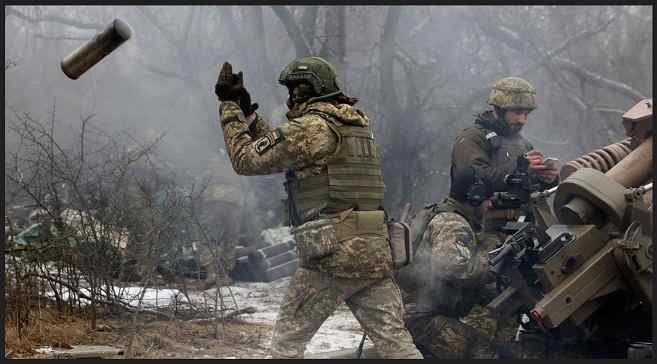Moscow claims it has broken the Ukrainian defensive lines in Lugansk but Kyiv denies it
The Ukrainian Defense Minister assures that Zelensky has asked him to continue and settles the speculation about his replacement | Brussels proposes to veto Russian citizens in the leadership of critical infrastructure companies as part of a new sanctions package.

The Russian Ministry of Defense has assured this Wednesday that its troops have broken the defenses of the Ukrainian forces in the province of Lugansk (east) and has forced them to withdraw three kilometers into an unspecified wooded area. “The Ukrainians left their positions in a hurry, without taking their equipment and their dead,” Moscow said in a report published on Telegram. Kyiv has denied the Russian information and, although it admits that the situation is “difficult” and denounces increasingly intense Russian bombardments, it has indicated that its army has been able to repel attacks by Kremlin forces in the area. In Kyiv, the Ukrainian Defense Minister, Oleksii Reznikov, has assured that Zelensky has asked him to continue in the post, settling the information about his replacement after cases of corruption in his ministry.
Brussels proposes to veto Russian citizens in the leadership of critical infrastructure companies in a new package of sanctions.
Post- Twitter earns up to $19 million for restored accounts
Ukraine accuses Russia of draining the Kajvoka reservoir
Kyiv accuses Moscow of ecological terrorism for causing a drastic drop in the water level in the Kakhovka dam, which may impact the country’s agriculture and ecology and create additional risks for the nearby Zaporizhia nuclear power plant. The Kakhovka Reservoir stretches along some 230 kilometers of the Dnipro, Ukraine’s longest river, supplying water to some 3.5 million people in the country’s relatively dry south, as well as its agricultural industry. The dam is currently under occupation by Russian forces, which during the withdrawal from Kherson last November intentionally blew up part of the road that runs above it.
Now, Ukrainian public representatives, including Prime Minister Denys Shmyhal, claim that the Russians deliberately opened the floodgates to reduce the water levels in the reservoir, proven by satellite images, although the authorities installed in Zaporizhia for Russian forces have rejected these claims. “It is difficult to describe it as something other than terrorism on the part of Russia,” said Tetiana Zhavzharova, director of the NGO Ecosense, from Zaporizhia and stressed that the inhabitants of the area are concerned about the drastic drop in the water level of the reservoir.
Post– The AI ChatGPT could pass the exam to practice as a doctor in the United States
According to the analysis of the local newspaper Zapsich, the levels began to drop at least two months ago and have fallen between one and a half and two meters in the last month alone, while daily losses are equivalent to a thousand cubic meters. “The waters have receded on the banks between 10 and 20 meters, and you can see a lot of dead young fish, which will surely affect the quality of the water when temperatures rise,” says Zhavzharova. The director of the NGO fears that the destruction of the riparian ecosystems will be such that recovery will take years to take place and that the centralized water supply will be affected as it is necessary to look for alternative water sources.
The drop in water levels is also worrying because the reservoir usually accumulates water in winter that is used for irrigation in the dry season. Maksym Soroka, an expert on environmental catastrophes at the Ukrainian State University of Science and Technology, explained in statements quoted by “Zapsich” that Russia’s actions increase the risk of famine and may cause the bankruptcy of many small agricultural companies. A reduced harvest would affect exports of agricultural products, which would hurt the Ukrainian economy and global food markets. In addition, in the Russian-occupied territories, many households already depend on the products they grow in their gardens and therefore on the water from the Kakhovka reservoir. On the other hand, the Ukrainian Prime Minister, Denys Shmyhal, warned on Tuesday that the decrease in water levels could cause malfunctions in the cooling system of the Zaporizhia nuclear plant. Shmyhal urged the “civilized world” not to remain silent and to put pressure on Moscow to close the dam gates and rebuild the partially damaged infrastructure of the Kakhovka hydroelectric plant.
The water from the reservoir is key to cooling the reactors of the largest nuclear power plant in Europe, under the control of Russian forces, but operated by Ukrainian personnel, the director general of the International Atomic Energy Agency (IAEA), Rafael warned this month. Mariano Grossi. “Although the reduced water levels do not pose an immediate risk to nuclear safety, they may become a matter of concern if they continue,” he said. For his part, the general director of Ukrhydroenergo, Ihor Syrota, explained on Tuesday that the current level is 13.9 meters and the risk to nuclear safety occurs from 13.5, adding that in recent days the situation has improved slightly due to the thaw.
